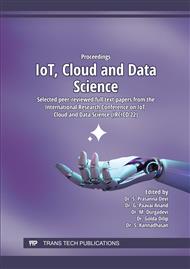[1]
S. Panja, S. Bag, F. Hao and B. Roy, A Smart Contract System for Decentralized Borda Count Voting,, in IEEE Transactions on Engineering Management, vol. 67, no. 4, pp.1323-1339, Nov. 2020,.
DOI: 10.1109/tem.2020.2986371
Google Scholar
[2]
G. Rathee, R. Iqbal, O. Waqar and A. K. Bashir, On the Design and Implementation of a Blockchain Enabled E-Voting Application Within IoT-Oriented Smart Cities,, in IEEE Access, vol. 9, pp.34165-34176, 2021,.
DOI: 10.1109/access.2021.3061411
Google Scholar
[3]
T. Vairam, S. Sarathambekai and R. Balaji, Blockchain based Voting system in Local Network,, 2021 7th International Conference on Advanced Computing and Communication Systems (ICACCS), 2021, pp.363-366,.
DOI: 10.1109/icaccs51430.2021.9441912
Google Scholar
[4]
K. Košt'ál, R. Bencel, M. Ries and I. Kotuliak, Blockchain E-Voting Done Right: Privacy and Transparency with Public Blockchain,, 2019 IEEE 10th International Conference on Software Engineering and Service Science (ICSESS), 2019, pp.592-595,.
DOI: 10.1109/icsess47205.2019.9040770
Google Scholar
[5]
A. M. Al-madani, A. T. Gaikwad, V. Mahale and Z. A. T. Ahmed, Decentralized E-voting system based on Smart Contract by using Blockchain Technology,, 2020 International Conference on Smart Innovations in Design, Environment, Management, Planning and Computing (ICSIDEMPC), 2020, pp.176-180,.
DOI: 10.1109/icsidempc49020.2020.9299581
Google Scholar
[6]
D. Suyitno, B. R. Aladhirus and R. W. Wardhani, Design and Implementation of Smart Card based Secure Key Storage The Blockchain E-voting Application,, 2020 1st International Conference on Information Technology, Advanced Mechanical and Electrical Engineering (ICITAMEE), 2020, pp.259-264,.
DOI: 10.1109/icitamee50454.2020.9398390
Google Scholar
[7]
S. Shah and a. et, Block Chain Voting System,, (2016).
Google Scholar
[8]
S. T. Alliance, Writer, Blockchain and Smart Card Technology. [Performance]. Secure Technologhy Alliance, (2017).
Google Scholar
[9]
Q. Li, Research on E-Commerce User Information Encryption Technology Based on Merkle Hash Tree,, 2019 International Conference on Robots & Intelligent System (ICRIS), 2019, pp.365-369,.
DOI: 10.1109/icris.2019.00098
Google Scholar
[10]
A. Auvolat and F. Taïani, Merkle Search Trees: Efficient State-Based CRDTs in Open Networks,, 2019 38th Symposium on Reliable Distributed Systems (SRDS), 2019, pp.221-22109,.
DOI: 10.1109/srds47363.2019.00032
Google Scholar
[11]
M. Stenbro, A Survey of Modern Electronic Voting Technologies,, Norwegia Univercity of Sciences and Technology, Norwegia, (2010).
Google Scholar
[12]
O. Boireau, Securing the blockchain against hackers,, Network Security, pp.8-11, (2018).
Google Scholar
[13]
S. Bartolucci and a. et, SHARVOT: secret SHARe-based VOTing on the blockchain,, UK, (2018).
Google Scholar
[14]
Tso and a. et, Distributed E-Voting and E-Bidding Systems Based,, MDPI Journal, vol. 8, no. 422, pp.1-22, (2019).
Google Scholar
[15]
G. Wood et al., Ethereum: A secure decentralised generalised transaction ledger,,Ethereum project yellow paper, vol. 151, pp.1-32, (2014).
Google Scholar
[16]
S. Nakamoto, Bitcoin: A Peer-to-Peer Electronic Cash System,, tech.rep., (2008).
Google Scholar
[17]
M. Pawlak, J. Guziur, and A. Poniszewska-Mara nda, Voting Processwith Blockchain Technology: Auditable Blockchain Voting System,, inLecture Notes on Data Engineering and Communications Technologies,pp.233-244, Springer, Cham, (2019).
DOI: 10.1007/978-3-319-98557-2_21
Google Scholar
[18]
J. -F. Pâris and T. Schwarz, Merkle Hash Grids Instead of Merkle Trees,, 2020 28th International Symposium on Modeling, Analysis, and Simulation of Computer and Telecommunication Systems (MASCOTS), 2020, pp.1-8,.
DOI: 10.1109/mascots50786.2020.9285942
Google Scholar
[19]
Fridrik .P. Hjalmarsson, Gunnlaugur .K. Hreidarsson, BlockchainBased E-Voting System,, in School of Computer Science Reykjavik University, Iceland.
Google Scholar


